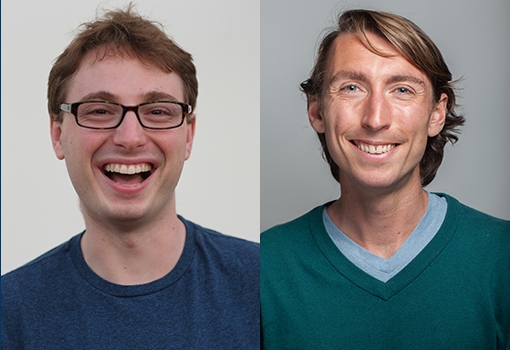Thursday, April 29, 2021
Two PhD students in UC Santa Barbara’s College of Engineering will have a unique opportunity this summer, attending invitation-only lectures and small seminars with some forty Nobel laureates from around the world. George Degen, a chemical engineering PhD student, and Samuel Teicher, a PhD student in the Materials Department, were among a group of thirty young scientists from University of California campuses selected as UC President’s Lindau Nobel Laureate Meetings Fellows and invited to attend the annual event in Lindau, Germany.
“These highly accomplished and diverse fellows to the Lindau meetings serve as UC ambassadors to the global scientific community,” said UC President Michael V. Drake, M.D. “They have been given a rare opportunity to directly engage not only with Nobel laureates, but with global peers equally passionate about scientific discovery. I anticipate that we, and the world, will benefit from the connections made and ideas sparked at this gathering of great minds.”
Due to safety precautions associated with the coronavirus pandemic, this summer’s meeting — to be held from June 27 through July 2 — will be a mix of interactive virtual and in-person events. While some 600 students and postdoctoral fellows from around the world usually attend the event, this year only about 120 will be randomly selected to participate in person, while the remainder will do so virtually.
“I am very excited to be selected to attend this meeting,” said Degen, a sixth-year chemical engineering PhD student. “I am particularly looking forward to meeting the other participants, both the Nobel laureates and the early-career scientists from around the world. Scientific discussions always have the potential to spark future collaborations.”
Degen’s advisors at UCSB include the late Jacob Israelachvili and his current co-advisors, Joan-Emma Shea, a professor of chemistry and biochemistry, and materials assistant professor Angela Pitenis. The goal of Degen’s research is to understand how marine mussels stick to wet surfaces. Ultimately, he hopes that his findings will help scientists design mussel-inspired adhesives for medical applications such as surgical adhesives and sealants. Previous awards received by Degen include the UC President’s Dissertation Year Fellowship, the Chemical Engineering Department’s Schlinger Fellowship, CSP Technologies Teacher-Scholar Fellowship, and the National Science Foundation’s Graduate Research Fellowship. Upon completion of his doctoral degree, Degen plans to conduct postdoctoral research in the field of soft matter, then launch a career in academia.
Teicher, who is advised by Distinguished Professor of Materials Ram Seshadri, first heard about the Lindau Meeting from two members of his research group who previously attended the event. Teicher works to discover new materials with interesting electronic properties for both quantum information and energy applications. He uses computers to simulate these materials, and then either makes the materials himself or collaborates with other groups that can create them.
“It’s a huge honor to be selected,” said Teicher, a fourth-year materials PhD student, whose previous honors include the National Science Foundation’s Graduate Research Fellowship and the Department of Energy’s SunShot Fellowship. “One thing that I’m really excited about is the chance to meet and listen to lectures from Laureates who have made tremendous contributions in my field.”
Teicher says that he is especially excited to attend a lecture from F. Duncan M. Haldane and J. Michael Kosterlitz, who won the Nobel Prize in Physics in 2016 for their work on topological phase transitions and topological phases of matter. Using a branch of mathematics known as topology, they discovered a new class of materials that behaves as an insulator, not readily conducting electricity, in the interior, but whose surface conducts electricity. Their discoveries transformed how scientists think about materials and paved the way for revolutionary technologies.
“More exciting than the new physics they discovered is what happens when you combine these topological materials with another class of quantum materials — superconductors. It’s thought that a topological superconductor could be used to create a quantum computer,” said Teicher, who is part of a collaboration on campus working on CsV3Sb5, a new compound discovered by Brenden Ortiz, a postdoctoral scholar in Stephen Wilson’s research group. “This material is a new superconductor. Moreover, my calculations, reinforced by incredible experimental efforts from several collaborators, suggest that this material has topological surface states as well.”
The UC Fellows were chosen in a multistep process that required an essay, letters of recommendation, an evaluation of their research accomplishments, and approval by event organizers.

Samuel Teicher (left) and George Degen were invited to attend the 70th annual Lindau Nobel Laureate Meeting.
